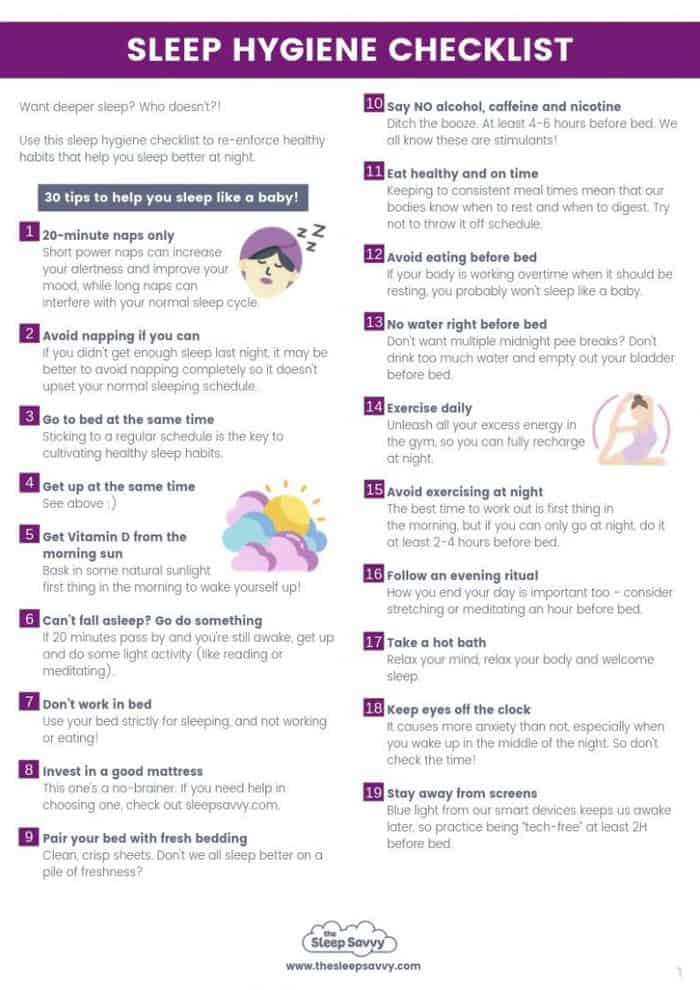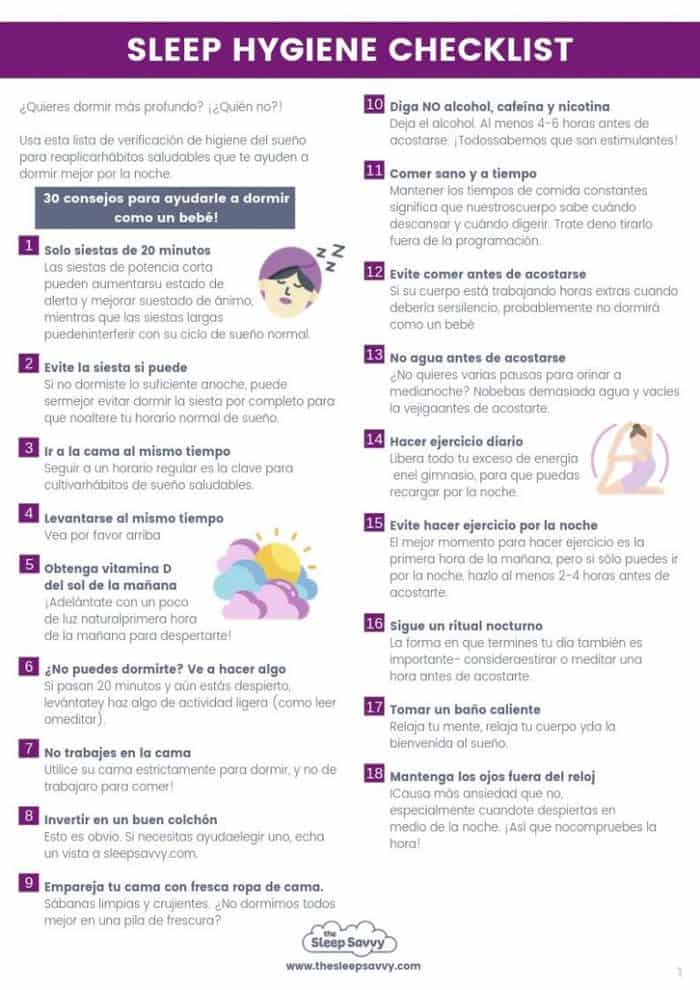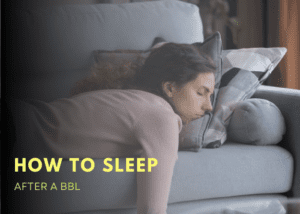Sleep hygiene, simply put, is a set of practices that helps you sleep better at night.
Cultivating these healthy habits (like any other change in behavior) requires determination and consistency.
It’s tough at first, but once you get into the routine, you’ll do it with ease.
Keep reading to get our FREE Sleep Hygiene Worksheet PDF handout below!
Why is Sleep Hygiene Important?
Many doctors suggest improving your sleep hygiene if you have any trouble sleeping.
Why is that?
Well, when we sleep we cycle through 4 different sleep stages multiple times throughout the night. During this time, our body and brain restores the chemical balance and heals itself.
According to the National Sleep Foundation, an adult needs about 7-9 hours of sleep every night to be able to function optimally, while a child requires about 10-13 hours.
Do you ever feel extremely tired and dull after having slept only for a few hours at night?
Maybe you find yourself unable to process simple work emails, or you zone out while talking to a colleague.
That’s because when you do not get enough sleep, both your physical and mental health suffer. Not only does your body feel tired, but you also have weaker cognition and mental abilities.
When you don’t get enough sleep, you have a higher risk of developing physical health conditions like:
- Diabetes,
- Heart disease,
- High blood pressure, and
- Weight gain and more!
Your mental ability is affected too. You may experience:
- Memory issues (both short-term and long-term)
- Sudden mood changes
- Trouble concentrating, thinking, and problem-solving.
Yikes, that sounds like me on a good day. (Just kidding!)
So, if you find yourself getting easily annoyed or snappy when you’re usually pleasant to be around, it might be due to a lack of sleep.
What's Good vs Poor Sleep Hygiene?
When you have good sleep hygiene, it means you’re doing things that help you sleep better. This includes all aspects of your life:
- Physical activities,
- Eating habits, and
- Bedtime rituals.
We’ll cover examples of good hygiene in detail below.
I think we know what poor sleep hygiene is. In fact, we’re probably quite familiar with it.
These unhealthy habits and practices affect how much and how well we sleep.
Do any of those sound familiar? (I bet they do!)
- Pulling all-nighters binge-watching your favorite shows on Netflix
- Sleeping at inconsistent times or really late at night
- Not taking care of your general health – Eg. eating right and exercising enough
30 Tips for Better Sleep
If you struggle with sleep deprivation, it may be a symptom of an underlying sleep disorder.
Try incorporating some (or all!) of these tips below to get more of that precious deep sleep. These sleep hygiene techniques work for teens and adults.
However if the problem persists, it’s time to consult your doctor.
Sleeping Schedule
 1. Nap no more than 20 minutes
1. Nap no more than 20 minutes
If you are someone who takes naps during the day, make sure it’s no longer than 20-30 minutes.
Taking a short power nap may actually be able to increase your alertness and improve your mood.
Long naps can interfere with your normal sleep cycle, so it’s best to avoid them.
2. Avoid napping altogether
For some, a nap is simply a part of their everyday routine.
Many times, people think if they did not get enough sleep the night before, they could make up for it with an afternoon nap.
This is not true.
Sorry to break it to you, but lost time is lost time.
If you did not get enough sleep, it might be better for you to avoid napping completely so that your circadian rhythm (your body’s natural clock) isn’t thrown off.
3. Go to bed on time each night
Regularity is a great quality to have while cultivating healthy sleep habits.
If you have a fixed time for going to bed every single night, your body will get used to that timing, and you will eventually find it easier to fall asleep.
4. Get up at the same time every day
It’s also great to get up at the same time each morning.
Similarly, your body will slowly get used to your schedule, and you’ll start waking up naturally at more or less the same time.
Even if you have slept poorly, waking up at the same time will allow your body to get used to the same sleep rhythm.
5. Get plenty of morning sun
Spend lots of time outdoors and make sure you get to bask in some morning sun.
Natural sunlight, especially early in the morning, can be beneficial if you want to set the natural wake and sleep cycle (AKA circadian rhythm) of your body.
For example, you can make it a point to take a “sun break” from work during the morning even if you don’t have time to go for morning walks.
6. Get up if you can’t fall asleep
If you find yourself awake after 20 minutes of lying in bed, get up.
Go to another room, and engage in a relaxing or boring activity that’s likely to make you drowsy.
For instance, you can read a book, listen to some music, or meditate. Limit your screen time – turning the TV on is probably not the best idea.
Then, when you start feeling sleepy, you can go back to bed.
Sleep Environment
7. Don’t work in bed
Good sleep hygiene involves using the bedroom strictly for rest.
So, while it may be tempting to curl up in bed, watch a movie and eat pizza, it’s best to avoid it.
Otherwise, your body will learn to associate these activities with the bed, making it harder for you to fall asleep.
8. Create a dark and quiet sleep environment
Your sleep environment is a major factor that determines your ability to fall asleep and the quality of sleep you get.
It’s important that your bedroom is a sleep-inducing space, meaning that it should be dark, quiet, and comfortable.
Make sure you have curtains that can block out the early morning light or any unwelcomed exterior lighting at night.
9. Keep the temperature nice and cool The temperature of your room also plays a huge role in determining how comfortable you feel in your own room, and ultimately, affects your sleep.
The temperature of your room also plays a huge role in determining how comfortable you feel in your own room, and ultimately, affects your sleep.
Make sure that you don’t feel too hot or too cold.
You can use the AC or a fan to set the right temperature so it’s easier for you to fall asleep.
10. Get a comfortable mattress
Your mattress is arguably the most important factor in the equation of getting a good night’s rest.
I mean, you lay on it for at least 6H every night, it should feel comfortable to you.
While some people like a soft mattress, some find it easier to sleep on firmer beds.
The comfort level of your mattress can directly affect the quality of your sleep; so, make an informed choice before buying a mattress.
11. Pair your bed with fresh bedding
To improve your sleep, make sure you have clean, soft, fresh bedding. You know, sheets, pillowcases and blankets or duvets.
Usually, people find it most comfortable to fall asleep on fabric like:
- Egyptian cotton,
- Silk,
- Pima, or
- Supima cotton.
These are not only comfortable, but they are highly durable and breathable as well.
Eating Habits
12. Limit alcohol consumption
For the best sleep, it is recommended that you avoid alcohol for at least four to six hours before going to bed.
You may think that alcohol helps you fall asleep faster, but the truth is that it disrupts your quality of sleep.
13. Say no to caffeine and nicotine
Nicotine and caffeine must be avoided at least four to six hours before bed if you want to fall asleep faster and also improve your quality of sleep.
This means that it’s best to avoid coffee, chocolate, carbonated drinks, certain medications, and cigarettes at least a few hours before sleeping.
14. Eat healthy and on time
As much as it is essential to eat healthily, it is equally important to eat on time.
Consuming a nutritious and balanced diet can help you sleep well. Now, a crucial factor that people often miss is ‘eating regularly.’
Make sure that you don’t skip meals, and you have breakfast, lunch, and dinner at more or less the same time every day.
15. Avoid eating before bed
If you have a heavy meal right before going to bed, then you may experience some trouble falling asleep.
Moreover, if you consume foods that tend to cause indigestion before bed, it will likely interrupt your quality of sleep.
To help with digestion, try sleeping on your left side.
16. Don’t drink water right before bed
Drinking enough water is vital, but you need to be careful and make sure that you don’t drink too much right before bed.
Or else, you might have to keep getting up in the middle of the night to pee.
Fitness
17. Exercise daily
 Regular exercise is a great way to ensure that you have a restful sleep.
Regular exercise is a great way to ensure that you have a restful sleep.
Make sure that you engage in physical activities for at least 30 minutes every day.
For improved sleep, the best time to exercise is in the early evening or late afternoon.
18. Avoid exercising right before bed
Make sure that you do not exercise before sleeping.
You may think that the tiredness will help you sleep better. But exercising less than two hours before you go to bed can disrupt your normal sleep.
19. Follow a relaxing evening ritual
You must develop a soothing pre-sleep routine to shift quickly from wakefulness to sleepiness.
Consider doing relaxing stretches or breathing exercises for 15 minutes before hitting the bed each night, or just sitting calmly sipping some caffeine-free tea.
20. Take a hot bath
A good pre-sleep ritual is taking a hot shower before snuggling into bed.
Not only does it de-stress your body, but also induces drowsiness by pushing up and then bringing down your body temperature.
21. Keep your eyes off the clock
Reading the time frequently at night is one reason why many people struggle to sleep well.
Doing so can wake you up, and triggers negative thoughts that you are incapable of sticking to a sleep plan. Especially when you have to turn on the light to look at the clock.
You must get over this habit at all cost.
22. Stay away from screens right before bed
Whether you are tapping through your social media feed or checking out YouTube videos, technological interactions before bedtime flush your brain with cortisol.
That’s the stress hormone that affects your metabolism, weight, and mood.
So, make sure you are completely “tech-free” at least 1-2 hours before you sleep.
23. Relax your mind
Stress comes in the way of your sleep, so you must do something that relaxes your mind and body before going to bed.
You can try a few relaxation exercises like calm breathing and meditation to calm your senses, and fall asleep quickly.
24. Write down your worries
To sleep better at night, you must leave your worries about life, work, health, relationships, and so on outside your bedroom door.
Create a “worry time” for yourself earlier in the evening to fret about your issues.
If any issue wakes you up in the middle of the night, try jotting it down and tell yourself that you will address it in the morning.
25. Don’t argue right before bed
When you argue with someone right before bedtime, your body is in a state of fight or flight.
This makes it so much more difficult to fall asleep, and once you do manage to fall asleep, it’s difficult to get quality sleep.
Besides, your chances of waking up in a bad mood are higher as well if you go to bed with unresolved issues.
26. Don’t watch scary movies before bed
Especially if you tend to have nightmares often, avoid watching scary movies before you go to sleep at night.
You may love a good jump scare now and then, but…
it’s best to watch scary movies during the day so you won’t have to deal with disturbing dreams that affect your sleep quality.
27. Don’t mess up your daytime activities
Even if you didn’t sleep well and are feeling tired the next day, it is important that you stick to your daytime routine as planned.
28. Don’t work right before bed
If you want to get a good night’s sleep, avoid work before bedtime. Work almost always causes some amount of stress, making it hard to unwind.
This makes it difficult for you to fall asleep peacefully when all you can think about is a report that is due the next day.
29. Don’t drive when you’re feeling sleepy
About 60% of adults admit they drove while feeling sleepy, and about 37% said they fell asleep at the wheel within a 12-month period.
This is extremely dangerous as falling asleep at the wheel is the cause of many accidents.
For safety reasons, it’s best not to drive when feeling sleepy.
30. Be consistent and follow-through
Sleep hygiene requires dedication and commitment. You must pick a plan and follow it consistently.
If you do the same thing every night, your brain develops strong neural patterns after which falling asleep becomes an effortless task
Sleep Hygiene PDF Handout
We summarized the above 30 tips into a quick, easy scannable PDF version.
Referring to this sheet can help you create (and keep!) good habits and practices.
Click on the button below to download this Sleep Hygiene Checklist – we have both English and Spanish version!
Sleep Hygiene FAQs
Got questions about overall good sleep hygiene?
Check out these commonly asked questions below.
Does sleep hygiene work?
 Yes, sleep hygiene works for those experiencing sleepless nights.
Yes, sleep hygiene works for those experiencing sleepless nights.
Maintaining proper sleep hygiene can prove beneficial to your physical and mental health.
Getting proper sleep can lower your risk of stroke, heart disease, diabetes, cancer, obesity, and Alzheimer’s disease.
It also helps to maintain a high energy level, improves mood, and wards off anxiety and depression.
Is it good or bad to read a book before bed?
Yes, it’s good to read a book before sleeping.
The habit is even more effective than drinking green tea or taking a relaxing stroll.
Reading for a mere six minutes can significantly lower stress levels.
If you have trouble sleeping properly at night because of stress, reading before bedtime can alleviate this and give a more restful sleep.
Is using gadgets before bed bad?
Yes, it’s bad to use electronic devices before bed.
They not only keep your brain stimulated, but the blue light emitted by all LED screens interferes with the production of melatonin, the sleep hormone.
The catch lies in the fact that you will still have a problem getting asleep in the future even if you are not using electronic devices before bed.
Is it okay to exercise at night?
No, you shouldn’t do vigorous exercise before bedtime.
Doing so an hour before going to bed can hamper your sleep. Your body won’t be as relaxed to fall asleep.
Your best bet here is to do moderate-intense workouts in the evening.
Why is my sleep quality so bad?
Your sleep quality may be bad for the following reasons:
- Doing rigorous, night-time exercises
- Drinking too much alcohol before sleeping
- Having an uncomfortable temperature
- Stressful lifestyle
- Consuming too much caffeine during the day
How can I calm my mind while sleeping?
You can do the following to calm your mind before sleeping:
- Practice mindfulness exercises like yoga, meditation, and deep breathing
- Cut down on screen time
- Drink Chamomile tea
- Take a relaxing hot bath
- Leave your worries outside your bedroom
What is the best natural sleep aid?
Here are a few natural substances backed by science that can help you get a good night’s sleep:
- Valerian root
- Melatonin
- Magnesium
- Passionflower
- Lavender
- Glycine
Among all the above, melatonin is a hormone that is released by the pineal gland in the brain.
It plays a crucial role in regulating sleep and circadian rhythms.
Synthetic melatonin is a popular dietary supplement that is available both as a sleeping aid and an antioxidant.
How do you fall asleep if you wake up in the middle of the night?
Here’s what you should do when your sleep breaks and you wake up in the middle of the night:
- Keep your phone away
- Get out of bed and do something for 20 minutes or so
- Cover the clock to prevent negative reinforcements
- Keep the lights dim or off complete
- Take a few deep breaths or meditate
How can I get to sleep instantly?
Here’s what you should do if you wish to fall asleep the moment your head hits the pillow:
- Lower the temperature of your room
- Follow the “4-7-8” breathing technique to calm your mind
- Follow a strict sleep schedule
- Avoid long, daytime naps
- Avoid looking at the clock
- Eat well
- Exercise HARD during the day
- Turn off all electronic devices
- Consider getting aromatherapy
- Maintain proper sleeping position
- Pick up a book or a magazine
- Limit your caffeine intake
Why do I wake up so much at night?
The following could be the possible reasons why you wake up so much at night:
- The room you sleep in is either too hot, cold, noisy, or bright
- You suffer from anxiety
- You have nocturia, where you get up to take a leak at least once during the night
- You drink too much alcohol
- You suffer from sleep apnea
- Your thyroid gland may be hyperactive
- You have restless leg syndrome
- You ate just before bedtime, or you didn’t eat enough before hitting the bed
How long should I be awake each day?
For most adults, 7–9 hours of sleep per night is the ideal amount, meaning you should be awake for 17-19 hours a day.
You must, however, pay attention to how you feel during the daytime to know if you are getting enough sleep at night.
If you are getting the right amount of sleep, then you should wake up feeling energized.
Awesome tips? Love our downloadable sleep hygiene PDF handout?
>> Keep learning! Check our review for the best organic mattress for back pain! <<







